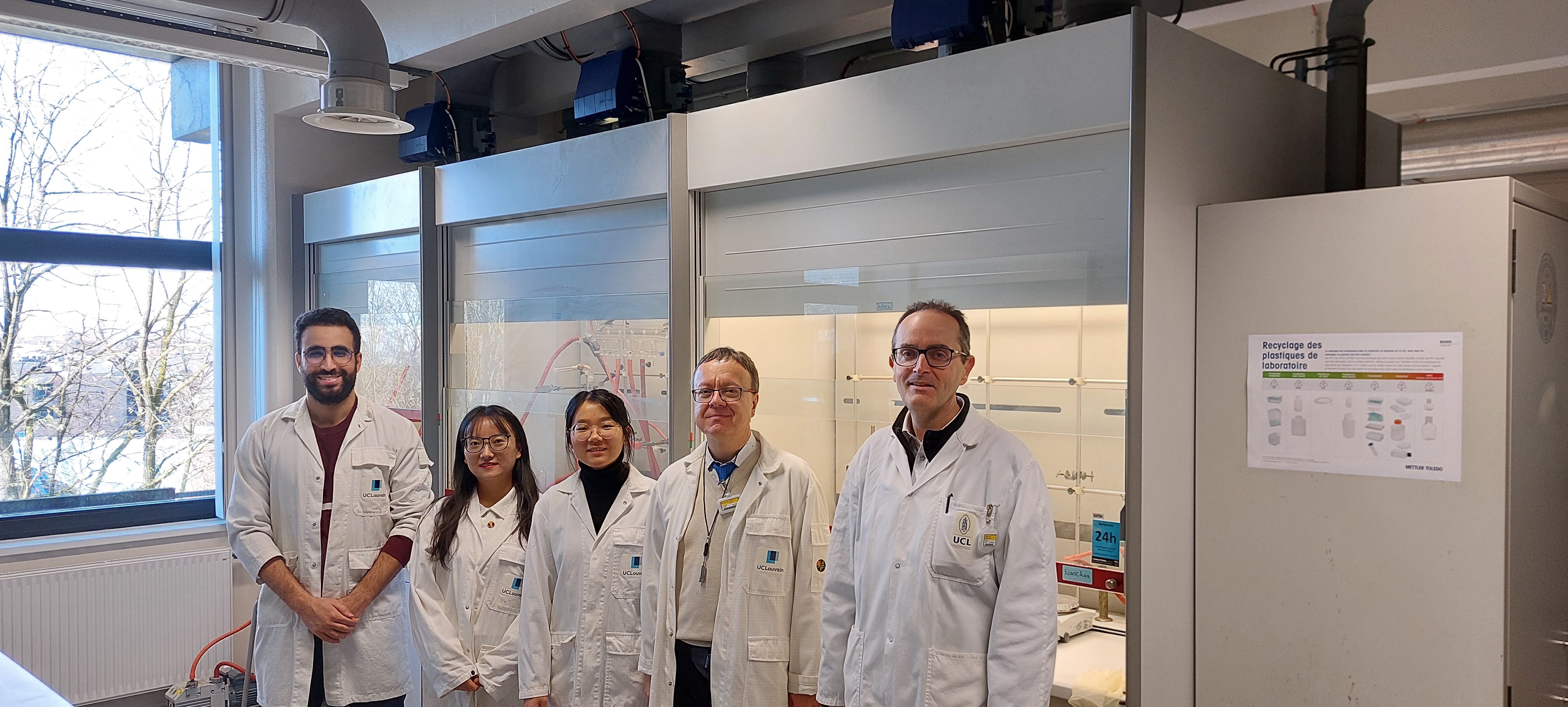
L-R: Group photo in the laboratory with Dr. Youssef Draoui, Xiaochun Li, Dr. Mengmeng Wang, Prof. Tadeusz Szumiata and Prof. Yann Garcia
Prof. Tadeusz Szumiata was visiting Prof. Yann Garcia at University catholique de Louvain (UCLouvain), Belgium. MEDC asked him a few questions on this special occasion.
MEDC: Prof. Tadeusz Szumiata, Greetings. You were visiting Prof. Yann Garcia at UCLouvain. What was the initial purpose of your visit?
TS: Well, initially, I planned to spend two weeks at UCLouvain, but I received an invitation from the European Association of National Metrology Institutes - EURAMET (https://www.euramet.org/) to review research projects submitted under the European Partnership on Metrology (https://www.metpart.eu/). Very conveniently, the reviewers' meeting was scheduled exactly in Louvain-la-Neuve (LLN) just one week before.
MEDC: How were received your lectures?
TS: Very positively I must say. I was very glad and honoured at the same time to give lectures for the staff and students of UCLouvain. I noticed a great interest and understanding of the subject presented. I tried to explain in simple words the application of Mössbauer spectrometry in environmental surveillance as well as in quality control in metallurgical industry. I also presented new perspectives in metrology after the redefinition of mass standard and the entire SI system of units.
MEDC: Overall, what is your first impression of UCLouvain and its facilities?
TS: Very positive. It is perfect place for teaching students and make research in many modern domains of science. I know, that especially the school of chemistry at UCLouvain is very famous all over the word. Owing to excellent equipment and generations of very experienced staff of chemists, UCLouvain achieves many successes, and is considered as the leading institution among French speaking universities of the country.
MEDC: Do you plan to collaborate further with UCLouvain and Prof. Garcia, in particular?
TS: Of course. First of all, I would like to express my gratitude to Prof. Yann Garcia for inviting me to UCLouvain and for previous cooperation as well as for the real friendship. Most likely future cooperation will be focused on temperature-evoked spin transition phenomena investigations in organometallic compounds by means of Mössbauer spectrometry, but not only.
MEDC: What do you mean?
TS: I mean regarding the use of developed balances in Radom that could be applied to nanochemistry issues.
MEDC: That sounds interesting. But, could you please tell us more about your own research. We heard about your recent success in environmental science applied Mössbauer spectroscopy and metrology.
TS: Since for about ten years, I have had great satisfaction in applying Mössbauer spectrometry to the investigation of various types of environmental samples like fly ashes from powerplants, soils, street dust and airborne particulate matter. I combine this technique with other methods – mostly with magnetometry and chemical analysis. It requires intensive cooperation with numerous research groups at my home university (Casimir Pulaski Radom University, Poland), as well as other scientific institutions in Poland and in the world. Being a physicist, I also try to help my colleagues-engineers in quality control of steel elements by means of Mössbauer spectrometry. My second domain of activity is modern mass metrology. I keep close links with the metrological industry and national metrological institutes. I was very proud to be in 2018, the first technical delegate of Poland to Sèvres (Le Bureau international des poids et mesures, BIPM) in order to explore the new standard of mass (so-called Watt-Kibble Balance). It opened many perspectives.
MEDC: Regarding instrumentation, we also heard that you will equip your laboratory with new modern Mössbauer instruments. Was the choice of the type of instruments difficult?
TS: That is true. We were successful with the application to the Polish Ministry of Science and High Education for the equipment grant. One of the crucial items of new equipment will be a set of Mössbauer spectrometers. Indeed, the choice is not easy, because fewer and fewer companies have decided to manufacture Mössbauer due to narrow market niche. Moreover, there is a strong discussion among the Mössbauer community, how to facilitate and automate the work with this technique but at the same time not to limit the hardware flexibility. And finally, due to the complicated geopolitical situation, this requires a serious storm-brain within leading Mössbauer spectrometry organizations, most probably at the IBAME level too.
MEDC: Talking about IBAME, who are the polish representatives at IBAME? We heard that the polish Mössbauer society undertook some changes. Could you please inform us?
TS: I would call it a good continuation. Poland has two IBAME representatives: Prof. Krzysztof Szymański and also Prof. Elżbieta Jartych, who was recently reelected with the great majority of votes. Prof. Jartych is a General Chair of the ICAME2025 conference.
MEDC: As we all know, ICAME25 will be organized in Gdansk, a beautiful city bordered by the Baltic sea, but we noticed that no Mössbauer groups are located in this city. Could you please explain us this choice?
TS: Mössbauer spectrometry is a very popular method in Poland and is present in several cities. The Organizers of ICAME25 do not intend to favor any of them, that is why the Committee has chosen Gdansk. But of course, it is not the only reason. Gdansk is a beautiful, Hansatian city located at the Baltic Sea coast. Gdansk is distinguished by its multiculturalism and rich history. It is a strong academic centre as well as a symbol of the Polish fight for freedom. You are very welcome to attend ICAME25 and to visit Gdansk.
MEDC: Thank you very much Prof. Szumiata. We wish you a safe trip back to Radom.
TS: You are very welcome, thank you.